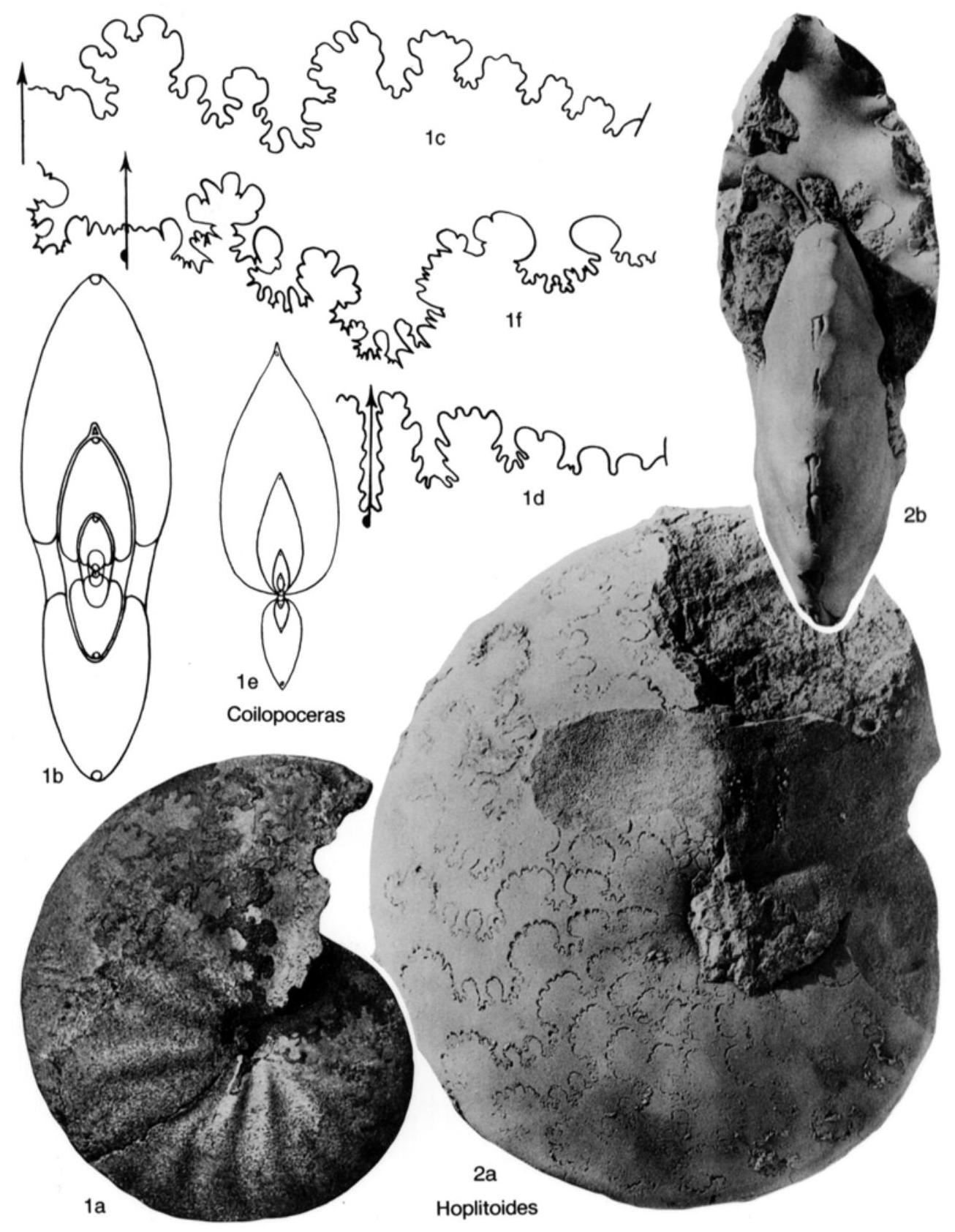Welcome to the Treatise on Invertebrate Paleontology!
Please enter a genera name to retrieve more information.

Coilopoceras
Classification
Phylum:
Mollusca
Class:
Cephalopoda
Subclass:
Ammonoidea
Order:
Ammonitida
Suborder:
Ammonitina
Superfamily:
Acanthocerataceae
Family:
Coilopoceratidae
Formal Genus Name and Reference:
Coilopoceras HYATT , 1903, p. 91
Type Species:
[*C. colleti; OD] [=Namadoceras VREDENBURG, 1907, p. 121 (type, N. scindiae; OD); Glebosoceras REYMENT, 1954a, p. 161 (type, G. glebosum; OD); Vredenburgia C HIPLONKAR & G HARE , 1976, p. 7 (type, V. khadluensis; OD)]
Images
(Click to enlarge in a new window)
F IG . 155,1a–d. *C. colleti, Upper Turonian, New Mexico; ×1 (Hyatt, 1903). ——F IG . 155,1e,f. C. glebosum (R EYMENT ), Turonian, Nigeria; e, approximately × 0.2; f, × 1 (Reyment, 1954a).
Synonyms
Namadoceras; Glebosoceras; Vredenburgia
Geographic Distribution
France, Spain, northern and western Africa, Madagascar, Lebanon, Israel, Baluchistan, Colorado, Wyoming, Texas, New Mexico, Mexico, Trinidad, Venezuela, Ecuador, Colombia, Peru
Age Range
Beginning Stage in Treatise Usage:
Upper Cretaceous (Middle Turonian)
Beginning International Stage:
Turonian
Fraction Up In Beginning Stage:
25
Beginning Date:
92.77
Ending Stage in Treatise Usage:
Upper Cretaceous (Upper Turonian)
Ending International Stage:
Turonian
Fraction Up In Ending Stage:
100
Ending Date:
89.39
Description
Large, with diameter up to 800 mm; involute; compressed to inflated; lanceolate to cordate in section, with more or less sharp venter; variable, broad, low ribs may persist; in inflated forms (Glebosoceras) ribs raised into large bulges on inner part of side on outer whorls; in some such forms ribs may be strongly projected ventrolaterally, but this is probably not significant. Suture variable; accessory saddle may be larger than the second lateral, which with auxiliary saddles tends to become entire in outline.
References
Museum or Author Information
Classification
Phylum:
Mollusca
Class:
Cephalopoda
Subclass:
Ammonoidea
Order:
Ammonitida
Suborder:
Ammonitina
Superfamily:
Acanthocerataceae
Family:
Coilopoceratidae
Formal Genus Name and Reference:
Coilopoceras HYATT , 1903, p. 91
Type Species:
[*C. colleti; OD] [=Namadoceras VREDENBURG, 1907, p. 121 (type, N. scindiae; OD); Glebosoceras REYMENT, 1954a, p. 161 (type, G. glebosum; OD); Vredenburgia C HIPLONKAR & G HARE , 1976, p. 7 (type, V. khadluensis; OD)]
Images
(Click to enlarge in a new window)
F IG . 155,1a–d. *C. colleti, Upper Turonian, New Mexico; ×1 (Hyatt, 1903). ——F IG . 155,1e,f. C. glebosum (R EYMENT ), Turonian, Nigeria; e, approximately × 0.2; f, × 1 (Reyment, 1954a).
Synonyms
Namadoceras; Glebosoceras; Vredenburgia
Geographic Distribution
France, Spain, northern and western Africa, Madagascar, Lebanon, Israel, Baluchistan, Colorado, Wyoming, Texas, New Mexico, Mexico, Trinidad, Venezuela, Ecuador, Colombia, Peru
Age Range
Beginning Stage in Treatise Usage:
Upper Cretaceous (Middle Turonian)
Beginning International Stage:
Turonian
Fraction Up In Beginning Stage:
25
Beginning Date:
92.77
Ending Stage in Treatise Usage:
Upper Cretaceous (Upper Turonian)
Ending International Stage:
Turonian
Fraction Up In Ending Stage:
100
Ending Date:
89.39
Description
Large, with diameter up to 800 mm; involute; compressed to inflated; lanceolate to cordate in section, with more or less sharp venter; variable, broad, low ribs may persist; in inflated forms (Glebosoceras) ribs raised into large bulges on inner part of side on outer whorls; in some such forms ribs may be strongly projected ventrolaterally, but this is probably not significant. Suture variable; accessory saddle may be larger than the second lateral, which with auxiliary saddles tends to become entire in outline.
